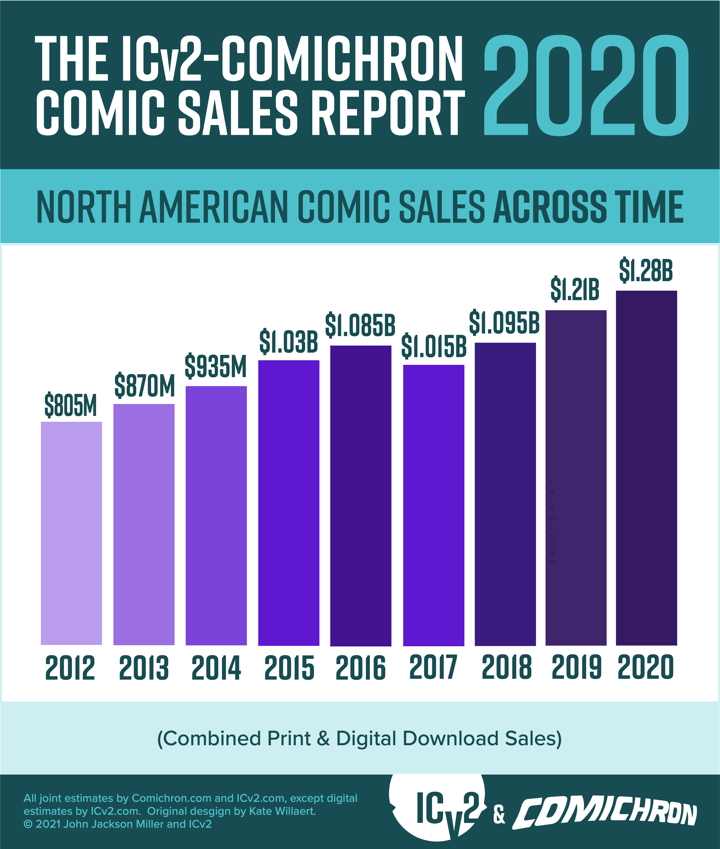Comics Disassembled: Ten Things of Note from the Past Week in Comics, Led by Numbers Going Up!
While I haven’t paid as close of attention to the world of comics during my hiatus as I normally would, there was still an insane amount of news I caught that would normally have led to big write-ups within this very column. I considered making this return edition of Comics Disassembled – in which I write about ten things I liked or didn’t like from the week of comics – the rare one that looked at a more prolonged period, focusing on June as a whole. But we’re not doing that! There’s too much to cover as is, and we’re just getting back on the regular schedule.
So let’s get to it, as we dive straight into a busy week, led by some big numbers reminding people that, oh yeah, comics are doing okay!

1. Comics, Going Up!
It’s that time of the year again, as John Jackson Miller of Comichron and Milton Griepp of ICv2 teamed up for their industry-wide comic sales report for the previous year this past week. Within it, the pair yet again triggered a deluge of “I tHoUgHt CoMiCs WeRe DyInG” tweets with numbers that looked quite rosy indeed. Record revenue! A third straight year of gains! Digital actually going up for the first time in, by my estimation, 500 years!
The whole report is worth digging into, with the 6% year-over-year growth being primarily fueled by continued expansion of the book channels and graphic novels (and manga! My god, manga!). These are not surprises, and they’re trends that only grow and grow. Digital – meaning buy-to-own, as subscription service numbers are not included – was one, however, as it went from $90 million in revenue to $160, nearly doubling from 2019. I reached out to Miller for perspective on that point, and while he said that’s mostly Griepp’s domain, it sounds like additional sources of information as well as pandemic-related growth was likely fueling that.
But when you consider the challenges the whole industry faced and other factors that aren’t included here – again, digital subscription services like Marvel Unlimited as well as the booming back issue market – these numbers read to me as a great year that doubles as the floor for what the overall performance actually was. Keep that in mind: these are the low level of estimates, and with other channels not included, the ceiling is much higher. That’s remarkable.
Oh, and shouts to Miller and Griepp for always doing those reports. I have no doubt that they are an immense amount of work, and I appreciate them even if I don’t make facetious tweets related to the contents of said report.
2. Direct Market, Needing Context!
There’s one more thing I wanted to mention about this report. Miller and Griepp contextualized this, but I know the internet does not enjoy reading, and I saw people tweeting about how both comic shops and comic books – the format, not the art form – actually backslid in 2020. That is true! But it’s also worth remembering a few key things about the year that was.
First, unlike digital and most larger online retailers/booksellers, most comic shops had to close to in-store customers for part or even all of the year. When I did my year-end report on the direct market, the minimum closure time was a month and a half, with mail-order and curbside and delivery offering some respite, but not a real apples to apples replacement. That’s an enormous contributing factor.
Second, as Miller noted in the report itself, comic sales might have been down 20%, but there were 30% fewer comics released in 2020 due to varying costs of the pandemic as well. So on a per-release basis, 2020 was actually up, even if it’s not clear if you only look at the pretty pictures.
You could make a case that comics and comic shops would have been up as well if it weren’t for pandemic impacts on the industry. While it’s clear that graphic novels – many of which are trade paperbacks that build off the aforementioned comics – and the book channel have become dominant parts of the comic world, there’s still a lot of juice here. That’s important to remember when internalizing what these reports show.
subscribers only.
Learn more about what you get with a subscription
